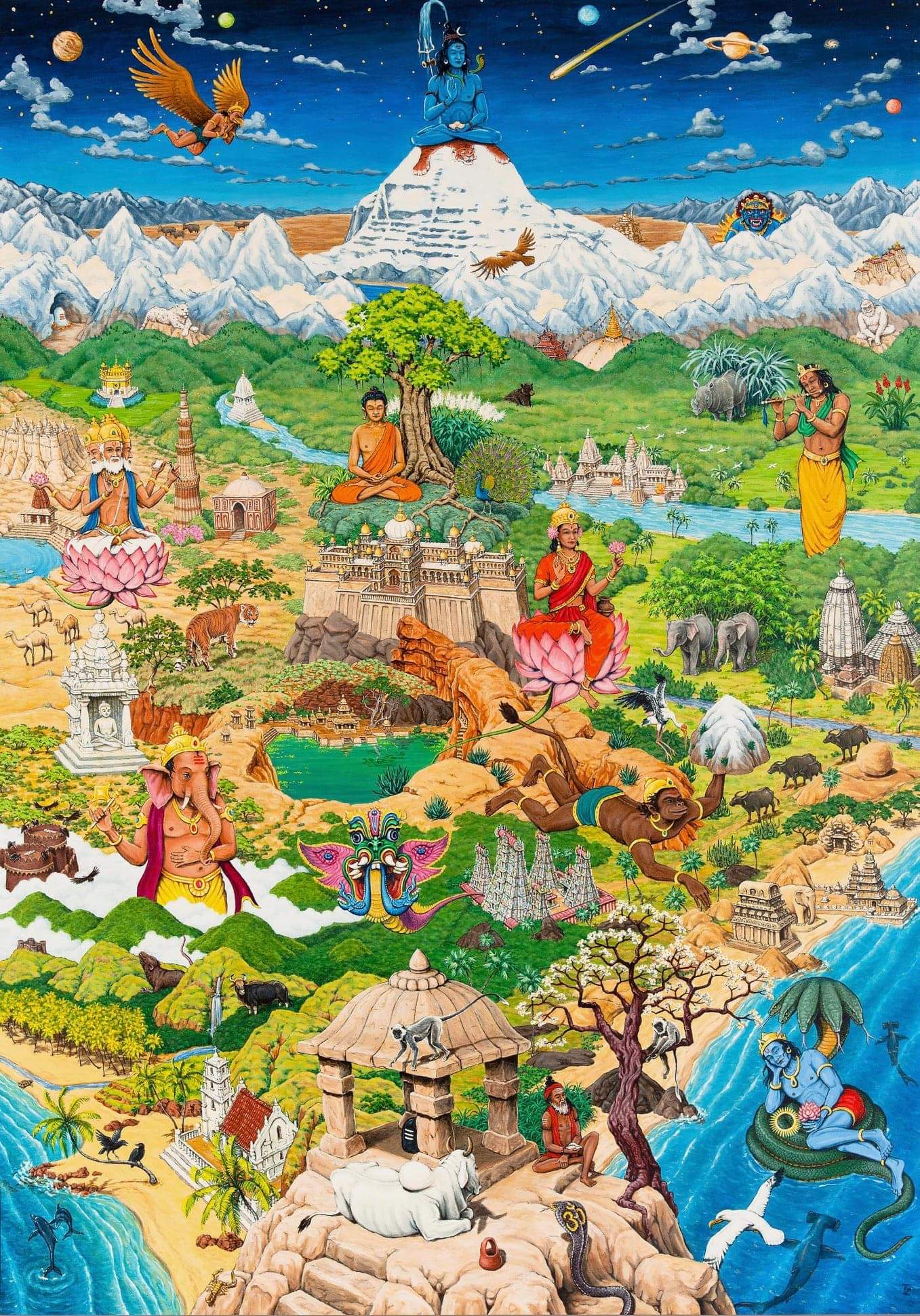BHARAT- The Mrityunjay Rashtra


||वयं हिन्दूराष्ट्रांग भुता:||
Why Indians are Hindus?
When the Shahi Imam of Jama of Delhi went to Mecca on a pilgrimage, a local resident asked him, “Are you a Hindu?” The Imam was startled by this question and replied, “No, I am a Muslim.” When Imam Saheb asked him the reason for calling him a Hindu, he replied that all Hindustanis were called Hindu there. (Saptahik Hindustan, May 1,1977)
What does “Hindu” Connote ?
Replying to the felicitation at the Indian Association Lahore, on February 3, 1884, Sir Syed Ahmed the founder of Aligarh University said, “We normally associate the word Nation with Hindus and Mussalmans. In my opinion, the concept of nation is not to be linked with one’s religious beliefs because all of us, whether Hindus or Mussalmans, have grown in this soil, enjoy common points of sustenance and prosperity and share common rights. This verily, is the basis for both these our sections in Hindustan to come together under the common name Hindu Nation… The term Hindu should not be identified with the Hindu community. All sections–whether they be Mussalman or Christian — are Hindu.” (Hamari Ekta Delhi April 15,1979)
A Frenchman asked an Indian, “What is your religion?” The reply was, “Hindu.” The Frenchman countered: “That is your nationality; but what is your religion?”
In fact, neither Arabs, nor Frenchmen nor the people of any other country have any doubt that “Hindu” connotes the nationality of this land. Arnold Toynbee in his monumental work A Study of History uses invariably the word Hindu to denote the race, the society and the civilisation born and grown here over the past millennia and extending right up to the present day.
Hindu : National of Bharat
Anyone who is the national of this country, irrespective of being a Shaiva, Shakta, Vaishnava, Sikh, Jain, Muslim, Christian, Parsi, Buddist or Jew by way of his creed or mode of worship, is a Hindu. As Justice M.C. Chagla has forcefully put it, “The French, with their sense of logic and precision, call Indians irrespective of their caste or community L Hindus. I think that is a correct description of all those who live in this country and consider it their home. In true sense, we are all Hindus although we may practise different religions. I am a Hindu because I trace my ancestry to my Aryan forefathers and I cherish the philosophy and the culture which they handed down to successive generations.
“If only we accept this proposition and call ourselves Hindus by race, it would be the greatest triumph for secularism.”
The Archbishop of Ernakulam, Dr. Joseph Cardinal parecattil, has stated that the “Church had to draw its cultural nourishment from the local soil – the rich resources of Hinduism.” Himself an ardent advocate of Indianisation of Church, the Archbishop affirms that all Indians including Christian and Muslims should imbibe this national culture of the soil.
Misunderstanding Persists
However, there is no lack of political leaders who consider the idea of Hindu Rashtra as rank communalism and a biggest threat to secularism. It is obvious that such assertions are motivated by some political consideration or other.
On the one hand, lok Nayak Jayaprakash Narayan says, “I believe that including Bangladesh and Pakistan we are one nation. Our states may be different, but all of us belong to the same Bharatiya nationality.” On the other hand, the Deputy Speaker of the West Bengal Assembly, Sri Kalimuddin Shams has stated: “Muslims form a separate nation in this country.”
It is not surprising, therefore, that all these various pronouncements should lead to serious misunderstandings and confusion regarding concepts like nation, state, Hindu, secular, etc., in the people’s mind. And the socaded big leaders are only busy making the confusion worse confounded with a view to catching votes and safeguarding their seats of power. They are also causing, thereby, serious damage to our national unity, mutual goodwill and the national will to work together. But politicians neck-deep in the game of power-politics seem to have little concern for such things.
However, people devoted to the nation and its all-sided progress cannot help delving deep into the question. For if there is no clarity of ideas, or the goal is confused and the hearts do not beat in unison, the nation’s onward march will falter, will get slowed down and may even go astray.
What is a Nation?
The foremost basic question is:What is Rashtra or Nation? Scholars on the subject are agreed that a mass of humanity assuming the nomenclature of Nation should be inspired by the feeling of “we-ness” or a common identity and identification. This means that such people experience a feeling of oneness with one another and consider themselves distinct from others. When Edward de Cruz asked a Japanese University student whether the Japanese people considered themselves nearer to the East or the West in their life-style, habits and beliefs, his reply was: “We are like neither the East nor the West. We are simply Japanese. In this fast changing world any dividing line between the East and West has become irrelevant. We take in whatever we feel is beneficial to us without bothering as to wherefrom it has come. But we do care that we remain Japanese all the same. We stick to certain beliefs and traditions and they keep us Japanese. WE have lived through many ups and downs, days of glory as well as adversity, but remained Japanese allright. And we are not in the least apprehensive that our Japanese character will suffer if we adopt one or the other thing necessary to maintain our existence in this world of competition.
DISCLAIMER: The author is solely responsible for the views expressed in this article. The author carries the responsibility for citing and/or licensing of images utilized within the text.
